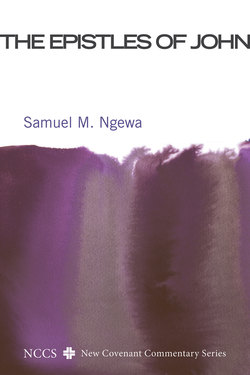Читать книгу The Epistles of John - Samuel M. Ngewa - Страница 8
На сайте Литреса книга снята с продажи.
About This Commentary
ОглавлениеThis commentary is written with the acknowledgement that it only amounts to, say, a bucket of water from Lake Victoria. Many other commentaries have been, are being, and will be written on the same books of the Bible traditionally referred to as the Epistles of John. Writing commentaries is more or less like the preaching that goes on all the time; only that it takes longer time and is more costly. Just as we may have a preacher doing a series on a book of the Bible to a congregation in London and another one doing the same to a congregation in Lagos (these cities selected for no special reason), so also are commentaries. The message of the Bible is so rich and important that the more it is passed on the better, and the more the persons who pass it on the better still. Each of us, however, passes it on within the limitations of our accent3 and understanding. I am grateful to brothers and Drs. Michael Bird and Craig S. Keener (extensively published scholars) who have organized some of us to write the New Covenant Commentary Series so that our “accents” can also be part of the millions of them from other regions of the world.
Those of us who are privileged to make a contribution by way of pen (now replaced by the laptop) and finger (in comparison to preachers who use the pulpit and tongue) do also bring our own personalities, experiences, and life goals. For me, for example, I have noticed that I am more concerned about a statement of review of my writing by a pastor in Accra (used for no special reason) how I related the message of Scripture to the African context than a statement of review on how I failed to explore this or the other theory in my commenting, so long as what I have said correctly represents my understanding of the author’s message. In the budgeting of time I spent in doing this work, I was more focused on what within my limitations I understand John (as will be shown below, John the apostle is assumed to be the author) to have meant when he wrote to his readers and how that applies to us today. What others say John meant is acknowledged, especially in footnotes, but without taking time to argue extensively with them. In my attempt to make clear why I understood a statement this or that way, I have in some places used the concept of shades or aspect of Greek verb tenses and noun cases. Definitions and some explanation of all the ones that are used in the work are provided as an appendix. The translation provided in the work is my own translation from the United Bible Societies Greek New Testament. Comments on variations in the readings from different manuscripts are kept to a minimum. Greek words are used in transliterated form except in a few places where they are a title of work used in this commentary. It is easier for a Greek student to convert the transliterated form into Greek than for a non-Greek student to use the work if Greek letters are used.
It is my hope and prayer that many students of Scripture will find this work a beneficial tool to work and interact with as they seek to understand God’s message to us and apply it in our times.
For words that have come to have two acceptable spellings, like savior and saviour, honor and honour, etc., the shorter spelling has been used, but without any prejudice. Also, small letters are used for pronouns (he, his, him, etc.) which stand for God, Jesus, and Holy Spirit but with full reverence and worship. They are used solely for simplicity in expression.
3. In his book, Healers to Physicians, Japheth K. G. Mati (a renown Kenyan medical professor and researcher) tells of an experience in Gainesville, Florida, where a waitress instructed another “take tea to that guy with an accent” (referring to him) and then Mati adds, “Actually I thought she was the one speaking with an accent” (172). Needless to say, our worldview is an accent in itself, and we all have one.
